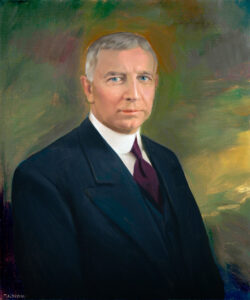Our Founder, William R. Kenan, Jr.
 William R. Kenan, Jr. was born in Wilmington, NC, on April 30, 1872, son of William and Mary Hargrave Kenan. He entered the University of North Carolina at Chapel Hill the fall of 1890 and took four years of science courses.
William R. Kenan, Jr. was born in Wilmington, NC, on April 30, 1872, son of William and Mary Hargrave Kenan. He entered the University of North Carolina at Chapel Hill the fall of 1890 and took four years of science courses.
As an undergraduate at UNC, Kenan discovered his passion for chemical and mechanical engineering from chemist Francis Preston Venable, who held the first endowed chair at the University and who would later serve as UNC’s president, from 1900-1914. Under Venable’s mentorship, Kenan participated in research that led to the identification of calcium carbide and the process for converting it to acetylene gas. This experience led directly to his successful professional career at Union Carbide.
After working for Carbide Manufacturing Company, which later became Union Carbide, Mr. Kenan was offered the job as consulting engineer for Henry M. Flagler, a partner of John D. Rockefeller in founding Standard Oil Company. Flagler retired from Standard Oil and began his development of the Florida East Coast Railroad, eventually building the railroad, eleven hotels, power and water companies, and agricultural enterprises. Mr. Kenan’s sister, Mary Lily Kenan, married Henry Flagler. Upon Mr. Flagler’s death, she inherited these companies, which Mr. Kenan managed. Mr. Kenan would become president of what was known as The Flagler System.
Mr. Kenan was also president of the Traders Paper Company and the Western Block Company in Lockport, NY, where he maintained a home. His interest focused on his Randleigh Farm, where his prize Jersey herd was nationally known. Mr. Kenan married Alice Pomroy of Lockport, NY, and the couple enjoyed a long and happy life in Florida and New York. They had no children.
Our History
 In April 1961 at age 89, Mr.Kenan signed his final will, allocating about $95 million of his $161 million estate to establishing a trust for educational purposes. Following his death four years later, the William R. Kenan, Jr. Charitable Trust started its formal grantmaking program. From the original corpus of $95 million, and after distributing more than 1000 grants worth nearly $530 million, the Trust has a market value today of over $705 million.
In April 1961 at age 89, Mr.Kenan signed his final will, allocating about $95 million of his $161 million estate to establishing a trust for educational purposes. Following his death four years later, the William R. Kenan, Jr. Charitable Trust started its formal grantmaking program. From the original corpus of $95 million, and after distributing more than 1000 grants worth nearly $530 million, the Trust has a market value today of over $705 million.
Throughout its more than 50 years of operation, the William R. Kenan, Jr. Charitable Trust has embarked on numerous multisector partnerships, and served as a facilitator of, and contributor to, national conversations about pressing issues of the day—America’s struggling education system, the socioeconomic challenges facing underserved communities, breaking the cycle of poverty. The Trust has focused on initiatives that improve literacy and college preparedness, contribute to community-building and economic vitality, and inspire a sense of collective purpose and shared humanity.
“A good education is the most cherished gift.”—William R. Kenan, Jr.
The Kenan Professorships also marked the first of numerous partnerships between the Trust and the University of North Carolina at Chapel Hill. The Kenan family ties to UNC—the first public university to open its doors in the United States—date back to the University’s origins in the 18th century. William Rand Kenan, Jr.’s great-great-grandfather, James Kenan, was among the first trustees of UNC, and his great-great-grandfather on his mother’s side, Christopher Barbee, was the largest single contributor of land to the University in Chapel Hill. Since then, many members of the Kenan family have attended and supported UNC philanthropically, and the Trust has been a steadfast supporter of UNC’s mission since its inception. In 1986, the Kenan Trust-UNC bond was further strengthened by the establishment of the Kenan Center as part of the Kenan-Flagler Business School. The Center houses the Trust and offices of four separate 501(c)(3) nonprofit corporations the Trust created: the William R. Kenan, Jr. Fund; the William R. Kenan, Jr. Fund for the Arts; the William R. Kenan, Jr. Fund for Engineering, Technology and Science; and the William R. Kenan, Jr. Fund for Ethics.
\Collaboration has long been a hallmark of Kenan grantmaking. In the early 1970s, for example, the Trust and the Southern Regional Education Board joined together to distribute grants to historically black colleges to strengthen their instructional programs. From an initial focus on excellence in teaching at the University level, the Trust has expanded its scope to the entire educational pipeline, making significant investments to enhance the quality of primary through professional school programs, including early childhood literacy, innovations in K-12 pedagogy, and strengthening collaborations between business and private enterprise. In doing so, the Trust has identified grantees who are established thought leaders in their areas of expertise, as well as pioneers in creative problem solving.
While education endeavors remain the central focus of the Trust’s grantmaking, the Trustees have broadened the definition of educational enterprises, recognizing that learning and personal growth can transpire both inside and outside the classroom.